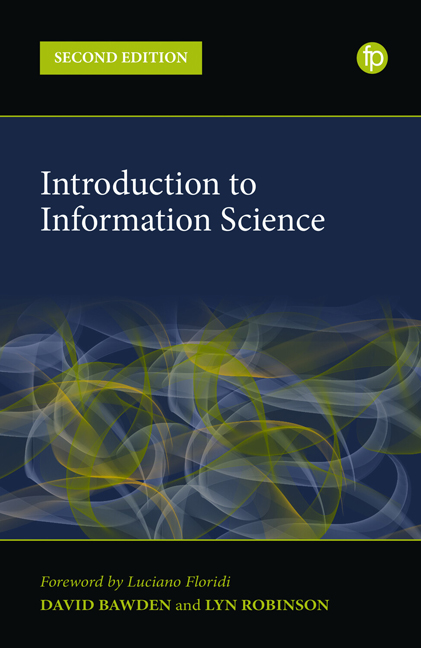Book contents
- Frontmatter
- Contents
- Figures
- Preface
- Foreword – Curators of Semantic Capital
- List of Acronyms
- 1 The Information Science Discipline
- 2 History of Information: the Story of Documents
- 3 Philosophies of Information
- 4 Paradigms, Turns and Theories in the Information Sciences
- 5 Information
- 6 Documents and Documentation
- 7 Domain Analysis
- 8 Information Organisation
- 9 Digital Technologies and Data Systems
- 10 Information Systems
- 11 Informetrics
- 12 Information Behaviour
- 13 Communicating Information: Changing Contexts
- 14 Information Management and Policy
- 15 Information Law and Ethics
- 16 Information Society
- 17 Digital (Onlife) Literacies
- 18 Research in the Information Sciences
- 19 The Future of the Information Sciences
- Additional Resources
- Index
8 - Information Organisation
Published online by Cambridge University Press: 21 April 2022
- Frontmatter
- Contents
- Figures
- Preface
- Foreword – Curators of Semantic Capital
- List of Acronyms
- 1 The Information Science Discipline
- 2 History of Information: the Story of Documents
- 3 Philosophies of Information
- 4 Paradigms, Turns and Theories in the Information Sciences
- 5 Information
- 6 Documents and Documentation
- 7 Domain Analysis
- 8 Information Organisation
- 9 Digital Technologies and Data Systems
- 10 Information Systems
- 11 Informetrics
- 12 Information Behaviour
- 13 Communicating Information: Changing Contexts
- 14 Information Management and Policy
- 15 Information Law and Ethics
- 16 Information Society
- 17 Digital (Onlife) Literacies
- 18 Research in the Information Sciences
- 19 The Future of the Information Sciences
- Additional Resources
- Index
Summary
The first step in wisdom is to know the things themselves: this notion consists in having a true idea of the objects: objects are distinguished and known by classifying them methodically and giving them appropriate names. Therefore, classification and name-giving will be the foundation of our science.
Carl LinnaeusObviously there is no classification of the universe that is not arbitrary and conjectural. The reason is very simple; we do not know what the universe is.
Jorge Luis Borges, The Analytical Language of John WilkinsIntroduction
The organisation of information, and of documents which convey information, is one of the fundamental aspects of information science. In many respects, this amounts to classifying and name giving: as essential in our science as Linnaeus proclaimed it to be in his, though for rather different reasons. These reasons are the needs to describe the nature of a document (its title, creator, date of creation, physical form, publishing details, etc.), fully and accurately, through cataloguing and metadata creation, and to denote its subject, what it is about, through classifying, indexing and summarising.
The subject may be referred to as either information organisation (IO) or knowledge organisation (KO). Often these terms are treated as synonymous. KO strictly refers to the organising and structure of knowledge itself, a rather abstract and philosophical activity, while IO is usually taken as the seeking of pragmatic solutions to the organisation of information-bearing documents, physical or digital, so that they can be accessed and retrieved. Hjorland (2012) notes that the terms are typically used in different contexts, but that the underlying theoretical principles are identical; he suggests that KO is the more appropriate term, because it relates to the social context of information rather than to information theory and computing. We will use the term IO throughout this chapter, for consistency with the title of the book and other chapters.
One of the main aspects of the subject is the way in which long-standing concepts and techniques are being adapted to the modern digital environment. Some fundamentals of the topic, particular aspects of the theory of classification, go back many centuries, and some of the main tools used today have their origins in the 19th century.
- Type
- Chapter
- Information
- Introduction to Information Science , pp. 133 - 166Publisher: FacetPrint publication year: 2022



